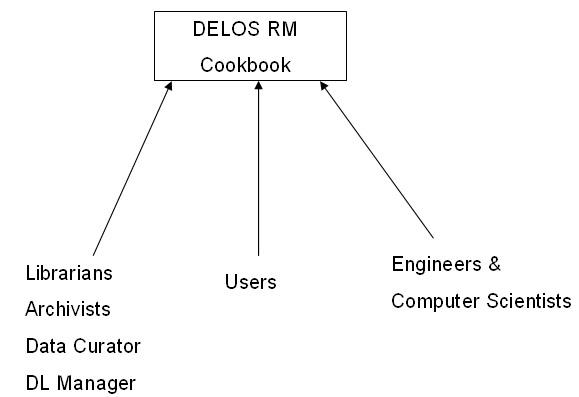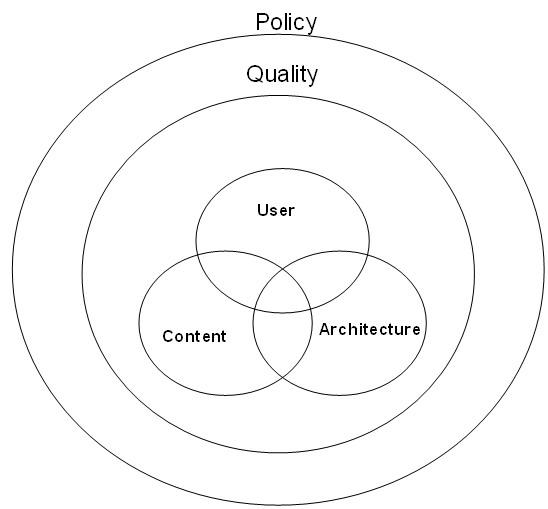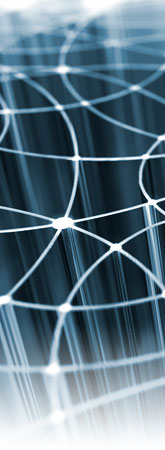Statements - 1st DL.org Workshop
DL.org would like to thank those attendees of the 1st DL.org Workshop, 1 October 2009, Corfu, Greece, during ECDL2009, who offered their own perspectives and feedback on DL.org's approach to interoperability following presentations and an interactive debate. Inputs revolve around the overall approach to DL interoperability, enhancing the DL Reference Model, as well as the Technology and Methodology Cookbook that DL.org will produce as one of its key outputs.
Rike Brecht - Ilmenau University of Technology (Germany)
One of the results of the project is a DL Technology and Methodology Cookbook. The consortium should have in mind 2 things:
- Who should use the Cookbook? What kind of requirements do they have? User of the Cookbook
- Discussing about patterns and scenarios consortium should try to find out what are the common, recurring issues faced when developing DLs?
- Content of Cookbook.
Schubert Foo – Nanyang Technological University (Singapore)
- Good work from all working groups. Congratulations. Due to the autonomous nature of each group, there is a need for communication to arrive at a “final” level of abstraction and interoperability guidelines formulation.
- Some form of formal description of DL is useful as part of the outcome as DLs are conceived differently. The formal description will help identify areas of interoperability in between DLs.
- The interoperability definition appears to be different among groups which makes item 1 more difficult to achieve. The Quality WG seams to have the highest challenge to define their boundaries/ parameters/criteria for defining their guidelines.
- Useful to include Librarians but they might not be involved with all the areas. Some librarians (more specifically trained / inspired) can handle the whole Reference Model. I would expect the newer generation of librarians be equipped with digital librarians’ skills/knowledge.
- I will give more feedback when I have the time to review the WGs’ documents.
Stefan Gradmann – Humbolt University of Berlin (Germany)
Suggestions:- Produce a DL.org primer document for the non-initiated (e.g. librarians).
- Develop on DL-specific issues a new version of the Reference Architecture document
Geneva Henry – Rice University (U.S.)
- The 6 domains need to define their interdependencies and impacts to the other domains. They cannot be researched and developed as silos in the framework.
- Need to meet with groups who have already done significant work on information systems frameworks. The e-framework has invested significant resources in this. DL.org can both borrow from this work and contribute to it to develop a rich interoperable framework that will support interoperability with more than just digital libraries.
- What about mass digitization? Is that effort being considered in the DL.org activities?
- Preservation and sustainability are other factors that are critical. Where do these fit in the proposed framework?
- User interoperability is really a need to define user/use case scenarios that feed into functional interoperability.
Perla Innocenti – University of Glasgow (UK)

Sarantos Kapidakis – Ionian University (Greece)
Functionality is the result of the combination of the other 5 issues, the one that we are mostly interested in achieving.
A different subject:
- Possible roles for Librarians on the Reference Model:
- Collection development (acquisitions)
- Cataloguing Librarian
- Classification Librarian
- Reference Librarian
- Reporting (statistics) Librarian

Ronald Larsen – University of Pittsburgh, School of Information Sciences (U.S.)
Good Workshop! Well done!- Consider whether Leigh Star’s concept of “boundary object” may have a role in understanding issues of interoperability.
- Peter Brusilovsky’s work on adaptive user modeling may also inform the development of the user modeling component.
- A challenge-based framework along the lines of TREC may draw in other participants as well as communicate what we are trying to accomplish to a broader community.
- The CFP is out for the 2010 iConference at UIUC. It would be good to engage the iSchools in the DL.org discussion, and the iConference provides a near term opportunity to do so.
Paolo Manghi – ISTI-CNR (Italy)
Separation between “generic framework” (any IS) and specific instantiations in the DL world for that frameworks.
Oddrun Pauline Ohren – Norwegian Archive, Library and Museum Authority (Norway)
First I think the DL Reference Model (DLRM) is a great initiative and has come a far way to create a conceptualization for the DL domain.
However, it is not perfect and is also “uneven” in the sense that the detailing and decomposition in the various domains are done very differently. QP WG has pointed out some important QP but has not really said much about the QP model itself. E.g. QP may be assigned to any object on any level of a DL. How should they be aggregated e.g. how will a QP value of a single object influence a QP value of the collection of which it is a part and the whole DL? At which component level should QP be assigned?
Policies might be expressed with rules/constraints or goals, for which formal and/or modelling languages do exist.
QP WG suggested including the organisational context in the model. Is it also sensible to include environment as a general concept, modelling the society with its authorities. The rules and regulations will greatly influence the policies of the DL.
Radoslav Pavlov (representative – Desislava Paneva-Marinova) – Institute of Mathematics and Informatics at Bas (Bulgaria)
Very interesting and useful session!
Suggestion:
- Organize training session/tutorial or online e-learning/training on DL interoperability, Best Practices and DL Foundations in front of DL developers, DL end-users, administrators or other actors in order to be appreciated the project approach or to be promoted. We are interested of a participation in such forum.
Ghislain Sillaume – CVCE (Luxembourg)
- Seems to be similarities between the work being conducted here and the objectives of Web Science initiative (but applied to DL rather the Web):
- Need to cooperate with other disciplines.
- Need to deal with a very complex and evolving information system.
- Need to engineer things and evaluating impact.
- Commons interests like identity, trustability, privacy…
- May be useful to involve User Experience Specialist (mean psychologists). There are already publications from their side that exist about DL.
Dagobert Soergel – University at Buffalo (U.S.)
Determine overlap between WGs:
- Functionality with Content: interoperability of functions with data, interoperability of functions based on data, detailed descriptions of functions that deal specifically with digital objects: ingest, format conversion, display of complex objects, annotation
- Functionality with Architecture: Software Component, component profile. Function and software component description has tow parts: (1) Description of what the function does for whom as related to DL services and behind-the -scenes operation (Functionality WG) (2) API, how software modules work together, composition, syntax of such descriptions etc., Web services specification (Architecture WG). (1) and (2) together make a complete description / specification / profile.
- Functionality with User: (1) User requirements as related to function description (2) Detailed description of functions relating to users, such as authentication and user profile creation
- We may want to encourage all working groups to keep a log of qualtiy parameters and policy problems as they encounter them.
The Quality WG needs to cover quality at a higher level as it relates to services to users.
The cookbook should have a section for assessing the quality of a DL. In the future it would be useful to have toolkit for assessing DL quality (an expansion, in a way, of the DRAMBORA toolkit for assessing the preservation function) perhaps a follow-on project.
At least one person mentioned to me that a database of detailed function descriptions would be incredibly useful to designers, especially if it includes design patterns (user interface oriented) and software components (implementation oriented). There are many places where content for such a database is already available, it is a matter of making all of this available in on place.
Geneva Henry mentioned that we should look at the JISC eFramework and build on what they have done.
Petr Sojka – Masaryk University, Faculty of Informatics (Czech Republic)
We will soon need “instantiation” of DL Reference Model in the EUDML- European Digital Mathematical Library (EU Project) starting in 2/2010. It should serve as “pilot B” project to make existing DML’s interoperable - (In other words, I offer EUDML being an instantiation of DELOS).
Julie Verleyen – Europeana (Netherlands)
Keep going and especially in the following direction: develop guidelines, “cookbook” (you name it) that would support someone asking himself/herself the relevant questions to develop/maintain solutions meeting certain interoperability requirements. The WGs’ documents would combine the right level of abstraction + use (uses, examples etc.) that would allow that someone to easily make analogies with his/her needs and that would avoid him/her not to miss anything important to reach interoperability.
One remark: interoperability regarding policies seemed the less easy to grasp.
Giuseppina Vullo – University of Glasgow (UK)
- Freedom of information
- Integration of competences
- Open Information spaces
- Equality
- Participation
- Exchange

